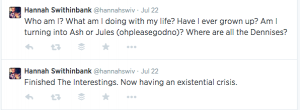But am I *interesting*?
Or: how I had an existential crisis on the back of reading a novel I recently finished Meg Wolitzer’s novel The Interestings for Book Club (which, again, possibly inevitably, I couldn’t get to - see you in September folks, I hope), polishing it off after an enjoyable few days reading at about 10:30pm. And then I prompty fell into a funk.
Screen Shot 2014-07-30 at 22.09.58
Normally with a novel I’ve really enjoyed I’m either buzzy or reflective afterwards, and whichever it is, my brain is engaged. With The Interestings I found it just didn’t want to. I really, really, enjoyed the book - and then the moment it was done I nosedived into a moment of complete blarghhh where I couldn’t shake the feeling that I was somehow like Jules, or worse, Ash.
I identified, possibly over-identified, with Jules throughout: I tend to have a semi-permanent feeling that I’m hanging out on the edge of groups of people who are more interesting or successful than me and to flake out about it (look, no one ever said this stuff was rational, ok, for me or for Jules). Yes, there were a lot of times when I wanted to shake her out of her mess of feelings and weird stasis, but I also completely understood where it was coming from - and I’ve been known to feel it. I don't like it, it's a complete waste of time, but, if you spend most of your time around people or in a culture that values success and renown - and fame - from your formative years on then this is what’s going to happen. There was no one but Dennis to tell Jules how valuable she was, and how gifted in entirely different ways, and for a large chunk of their relationship - when Ethan and Ash were really taking off - he wasn’t emotionally available to do that.
But as Jules mulls over the fact that:
“Ash was talented, but not all that talented. This was the thing that no one had said, not once,” Jules reflects. “But of course it was fortunate that Ash didn’t have to worry about money while trying to think about art.”
or Ethan’s comment that
Ash is this big feminist director, and yet she never seriously considered Cathy Kiplinger’s version of what happened with Goodman. And that was never a contradiction for her.
I began to worry about bits of me that might be like Ash. Am I wasting my time doing the things I’m doing? Am I not as smart or interesting or good at the thing as I want to be or should be in order to be where I am? It’s not a pretty rabbit hole, nor a rational one - even less rational and healthy than the Jules moments. But feels worse, because - come on - we all know that people like Ash happen in life and have careers that we might want and don’t think that they deserve, and who really wants to think that they might be one of them?
Ergo, brain shut down.
Which, worryingly is probably quite an Ash or Goodman thing to do. IF I DON’T THINK ABOUT IT, IT’S NOT HAPPENING. Send me an Ethan to put me back on my feet and look after me, or a Jules to be my sarcastic, real-world rock. Or better a still, a Dennis, to be a more gentle, real-world rock, who is mostly ok with living in the real world (other than the brain chemistry).
I’m still trying not to think about it too much, because I know my tendency to go there if I do. I’m like, squinting at it sideways at the moment. In reality it’s not a question of being Ash or not being Ash (or any of the other characters, with their particular lopsided flaws). It’s about trying not to be Ash and to be more like Dennis with his appreciation for the ordinary. Hello self-awareness.
Most people aren’t talented. So what are they supposed to do— kill themselves? Is that what I should do? I’m an ultrasound technician, and for about a minute I was the director of a summer camp. I’m a quick study. I learn skills and I read up on things to compensate for my absolute lack of specialness.
And, I think, about trying to make the Dennis’ of the world - and the rest of us - come around to the place that Jules seems to be moving towards at the end, that talent and ‘specialiness’ isn’t just about the arts, changing culture, or being reknowned. That Dennis’ skills are talents - or gifts, or a vocation or call - for keeping other people balanced, as he does when he is able to be balanced is a gift, and the ability to be a quick study is a talent, worth recognition by those around them and general acknowledgement as such at large. And that worth and specialness does not lie in succes, or in being recognised externally (though one would think it advisable to be married to someone who consciously recognises your worth), but in you, and who you are and how you live, regardless of whether the world gives you badges for it.
